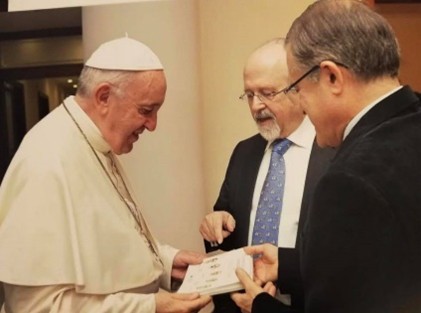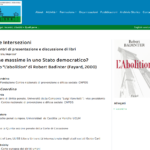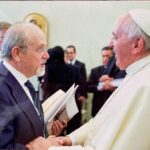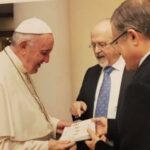Luis Arroyo Zapatero and Antonio Muñoz Aunión
Honorary Rector of the University of Castilla La Mancha, President of the International Social Social Society. Prof. of International Law in University Jaen. Founders of the International Academic Network against the Death Penalty. 27 April 2025
The first surprise Pope Francis gave us was that he did not only address Catholics or only Christians, but all people of good will. And the first surprise for jurists was that on his first Holy Thursday in 2013 instead of going to wash the spotless feet of twelve cardinals in the Vatican he went to the Regina Coeli juvenile prison and washed the feet of precisely twelve young people, two of them women and, to top it off, one of them Muslim. It was all said and done. He did it again this last Holy Thursday. Just in case, a few days later, he published an “Apostolic Exhortation”, with a severe criticism of what has been called neoliberalism and which had led to the 2008 crisis, condemning millions of people to misery and denouncing the treatment of them as “discarded”. Soon after, he published his first encyclical, Laudate yes, which put an end to the frivolous or denialist treatment of climate change.
When I learned about the new Pope’s entire life, I realized that his hasty visit to the island of Lesbos had a lot to do with his parents’ status as Italian emigrants and with the tragedy that often accompanies migrations, as happened to those who boarded the ship for which they had paid the tickets that was to take them to the Americas and which sank and not a few died, and on which they did not board because they had not yet been able to sell all their belongings.
Pope Francis had already spoken out against the death penalty without exceptions before criminal lawyers from all over the world and their international scientific organizations in Rome in 2014. In the same proceedings he formulated the full disqualification of life imprisonment as a death penalty in disguise. But although the catechism written in the 1992 edition by John Paul II had largely disqualified the death penalty, it maintained it as an exception in paragraph 2267 for “cases in which it is the only way to effectively defend human lives from the unjust aggressor”, a clause that allowed its abusive use in many countries, as happens to the systems that claim to be exceptional, in that exception the extremist Catholics relied on to defend or excuse it.
On March 20, 2015, the Pope held a private audience with Federico Mayor Zaragoza, president of the International Commission against the Death Penalty, which had been created in 2010 at the request of President José Luis Rodríguez Zapatero. He was accompanied by Asunta Vivó, secretary general of the Commission, Roberto Carles, secretary general of the Latin American Association of Criminal Lawyers and Criminologists, and the undersigned. It is very impressive to be alone with the Pope around the table in that office that we have seen so many times when he receives heads of state. Seeing the Pope dressed as such and speaking in Spanish produces an almost physical sensation. Neither he nor Federico Mayor stopped talking about everything, except the death penalty, because when Francis sat down he moved a text on the table towards Mayor and told him “I will deal with this matter”. So Mayor went on to warn about the men of peace who had been assassinated, from Kennedy to Isaac Rabin. Of the latter, Francis said that he was “a great man”. He told the Pope what he intended to say in the American Congress and at the UN on his immediate trip, which Mayor took advantage of to warn him about the Republicans, although as a reader of his first apostolic exhortation he knew he was well enlightened. We did not know it until later, but the Pope had just been informed that the following morning at an open-air Mass in Naples a possible Mafia attack had been detected, which does not forgive the Pope for excommunicating them. The same thing happens to them as it does to not a few Catholic conservatives, who do not like the Pope telling them what is wrong.
A few months later we went to the Vatican to present to the Pope the book that the scientific societies had published to accompany his text “For a truly humane justice”. When, after José Luis de la Cuesta gave him the book, I went to present it to him, he did not give me a chance to finish. “You are the one against of the death penalty,” he said, and then ordered, “and tell Mayor and our friend from Seville (Asunción Milá, in this time 95 and today happy 105) that I have asked Cardinal Schönborn from Vienna to study the matter and I have told him to hurry up. So it was, fortunately, and on August 1, 2018 it was announced by the Spanish Jesuit Cardinal Luis Ladaria, president of what was first Inquisition, then Holy Office and since 1965 has been called the Congregation for the Doctrine of the Faith. It is not just a change of name, it is the renunciation of the purifying fire.
The letter, expressly approved by the Pope, states that, while in the past the death penalty may have seemed an acceptable instrument for the protection of the common good, today there is a growing awareness that the dignity of the person is not lost even after the commission of very serious crimes. It also says that a new understanding of the meaning of penal sanctions has spread, that they must be oriented above all to the rehabilitation and social reintegration of criminals and, finally, that effective systems of detention have been implemented that guarantee the necessary defense of citizens, all of which has given rise to a new awareness that recognizes the inadmissibility of the death penalty. The letter takes up previous arguments of the Pontiff himself, especially that the death penalty implies cruel, inhuman and degrading treatment, that it is applied with broad social and racial discrimination and that it is irreparable in the face of judicial errors. To substantiate all this, he refers to the letter delivered to the President of the International Commission Federico Mayor Zaragoza. In effect, the Pope, as he told us in the aforementioned meeting, has taken charge of the matter and has complied with what is in the sphere of his competence, while maintaining his commitment to the international abolitionist movement. The Pope has reaffirmed the sense of the reform of the catechism in his address to the members of the International Commission against the Death Penalty on the occasion of his visit on December 17, 2018. There the Pope recognizes that, in the previous time, that of the first reforms of the relevant article of the catechism, “the current level of development of human rights had not been reached and recourse to the death penalty was presented as a logical and just consequence. Even in the Papal States this inhuman form of punishment had been resorted to, ignoring the primacy of mercy over justice”. With the renewed catechism the official doctrine is that “the death penalty is always inadmissible, because it violates the inviolability and dignity of the person”.
For Church times the process has been very rapid. Grounding abolition in the idea of the dignity of human beings was a great contribution to the 70th anniversary of the Universal Declaration of Human Rights. Francis has been very consistent with his program of reforms and renewed ideas since his very first apostolic exhortation of 2013 and his critical view of the international economic order, with his Encyclical on care for the environment, Laudato Si, with his campaign against hunger or his key diplomatic actions in places of war like Ukraine, Iran, Syria and in recent years again on Ukraine and on Gaza, or in risky visits like to the Central African Republic or to Chile, although here for very different reasons.
The Pope was above all a normal person, who had known ordinary studies, friendships and dealing with boys and girls and as an adult had lived through the Argentine tragedy in which the violence that incorporated sectors of Liberation Theology was answered by genocidal military who, yes, were daily mass and after receiving communion from the hands of the nuncio and the primate coldly ordered to throw the prisoners from military planes on the high seas, after countless tortures. He did what he could, being at that time superior of the Jesuits, and “what he could” is always a lot in a dictatorship and has great merit. Between a violent theology and a genocidal theology, he was entrusted to carry out the theology of the common good and he has dedicated all these years of papacy to it. Until his last day. It is worth reading the text of his Sunday City and the World blessing on the Vatican website and complete it with what was his first resurrection Sunday in 2013. It is clear that he was a beneficent reformer, a friend of human beings of good will, a stalwart of the needy and the discriminated. In this stormy time we have lost a good compass to pursue the common good.
But also on the last day he urged us to believe in hope, a principle that is also the title of his latest book, Hope Never Defrauds, and which leads me to recall his first Holy Year, the Year of Mercy, which is the classic word for what we call Solidarity today.
(Photo in Santa Martha Closter with Jose Luis de la Cuesta presenting the joint book “Passion of Cruelty”, 2016).






No comment yet, add your voice below!